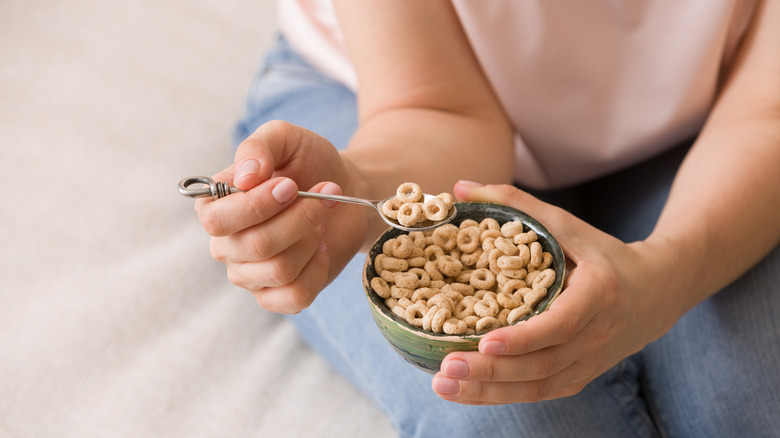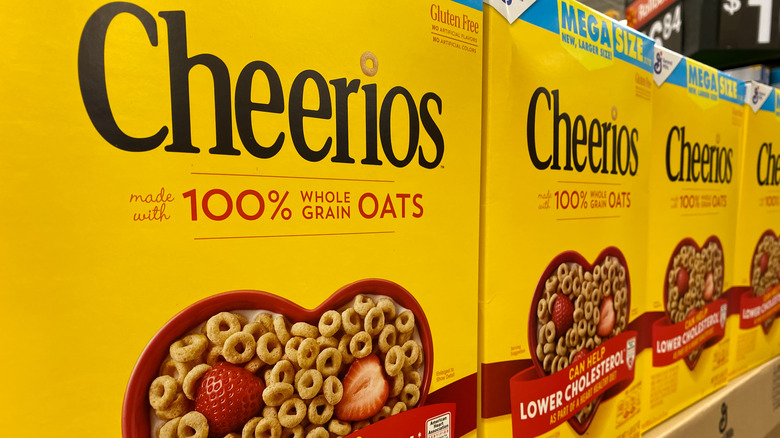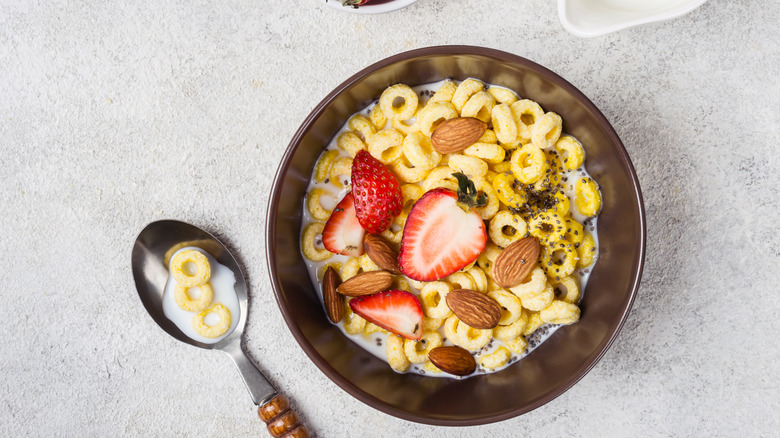Can The Cheerios Diet Really Help With Weight Loss? Here's What We Know
Breakfast cereals have long been under scrutiny for their added sugar content, and it's not hard to see why. With everything from marshmallows to chocolate shavings added to them, there is more than enough to be concerned about.
Enter the Cheerios diet which recommends you eat 1-2 cups of Cheerios for your morning meal, followed by 3/4 cup before lunch, and another 3/4 cup as an afternoon snack. You complete the meal plan by having a balanced lunch and dinner too. With the General Mills Original Cheerios box's bold claim of, "Can help lower cholesterol as part of a heart-healthy diet," you might wonder — are Cheerios good for you? Original Cheerios are made using whole-grain oats, corn starch, sugar, and salt. One cup also contains 1 gram of sugar, 3 grams of fiber, 3 grams of protein, 2 grams of fat, some calcium, iron, and zinc, and also the vitamins A, C, D, and B12, per Healthline. Sounds healthy enough, right?
According to nutritionist and author, Lisa Richards (via SheFinds), "Most cereals, even those marketed as healthy, can be damaging to your weight loss goals." And Cheerios might be the worst one yet, particularly if you're going to derive most of your nutrients from it. "When it comes to Cheerios unique weight loss benefits, it is lacking in nutrients beneficial to weight loss and has a hefty amount of nutrients that stall weight loss like added sugar," shared Richards.
There's considerably less protein and fiber in Cheerios
Part of a good weight loss plan is consuming sufficient amounts of protein and fiber that keep you feeling fuller for longer. Cheerios have relatively less protein and fiber when compared with other cereals like Kashi GO Lean cereals.
According to culinary and integrative dietitian, Marisa Moore, per Prevention, "Fiber slows the speed of digestion, which makes you feel full and may help you eat less and stay satisfied longer." Also fiber, unlike carbs, is non-digestible, which is why it aids regular stool movement. Plus, as explained by registered dietitian and certified diabetes educator, Karen Graham in Eat This, Not That, with breakfast cereals, it's always important to consider the fact that carbs are going to be converted into blood sugar. So unless you're planning to expend all the extra carbs you're getting from a Cheerios diet with plenty of exercise daily, it is unlikely that it will help with weight loss.
Protein is another important element in weight loss and a cup of Cheerios doesn't offer much by way of protein. In addition to providing a metabolic boost (your body burns calories while digesting protein) and preserving lean muscle during weight loss, protein also helps you stay full for longer, per Eating Well.
Should you be eating Cheerios at all?
Compared to most other cereals out there, a bowl of Original Cheerios (not the Honey Nut, Chocolate, Apple Cinnamon, or Frosted kinds), isn't necessarily bad for you, as long as you incorporate it into a balanced diet. The plain Cheerios are also better when compared to the sweetened Multigrain and Ancient Grains.
You have to keep in mind, however, that despite the whole grain oats, vitamins, and minerals Cheerios boasts about, it is still considered processed food. In fact, according to board-certified family physician, Dr. Ken Berry, even the vitamins are synthetic (made in the lab) so you're probably better off gaining essential nutrients and vitamins from lean protein sources, plenty of leafy greens, and whole-grain rice or rolled oats.
However, if you do enjoy a bowl of plain Cheerios every now and again, you can throw in some extra protein and fiber — in the form of whole nuts, seeds, and fresh fruit — and some plain low-fat milk and enjoy it for breakfast. But thinking that you can eat Cheerios three times a day along with two other meals and still shed pounds is one of those weight loss myths you should stop believing. You won't be able to accomplish the calorie deficit you're after. Plus, you won't be getting the nutrients you need to help with weight loss.



